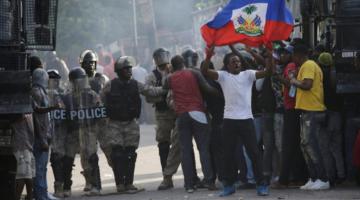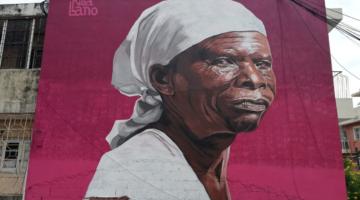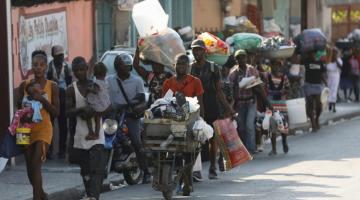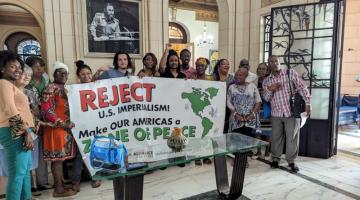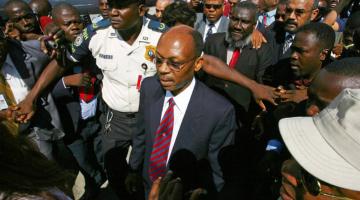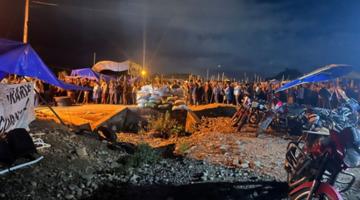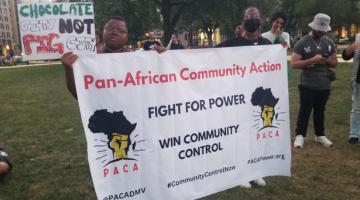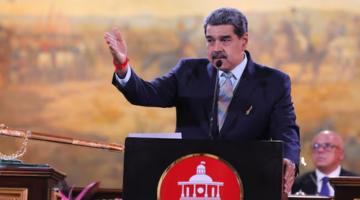The ongoing protests in Haiti are ultimately directed against the “Core Group” – US imperialism and its junior partners, who have teamed up to gang-bang the wounded and bleeding Black republic.
“The young people have been protesting under the idea that Haiti not only needs the resignation of President Moïse but also a full structural change.”
Haiti is in the middle of the fifth straight week of anti-government protests that have effectively shut down the country. Hundreds of thousands of people have taken to the streets, with one of the largest demonstrations in Haitian history taking place this past Sunday, October 13th. Makeshift roadblocks have been erected throughout the country, schools are closed and businesses shuttered, hospitals are barely managing, while agricultural goods from the countryside are unable to reach their markets, a situation acutely felt by Haiti’s rural populations. Some seventeen people have been shot and killed –by most accounts, by the Police Nationale d'Haïti—and more than 200 people have been reported injured. A prominent journalist, Néhémie Joseph, was assassinated.
The protests are not entirely new. They are a continuation of the reaction to the PetroCaribe scandal and the profound corruption of the current government. However, framing these current protests and the ensuing political crisis only through discussions of poverty and corruption – as many journalists and academics have been doing (with important exceptions) – succumbs to an imperial amnesia. It is to forget the broad set of imperialist actions that created the conditions for protest. It is to perpetuate the easy narrative – the racialist tropes – of Haiti and Haitians as inherently corrupt and violent. It is to also condone the ongoing machinations on Haiti – the workings of an “international community” bent on keeping Haiti on its knees.
“The protests are a continuation of the reaction to the PetroCaribe scandal and the profound corruption of the current government.”
The “PetroCaribe” initiative that has benefitted Haiti since 2007 is crucial. PetroCaribe was a program established by late Venezuelan president Hugo Chavez to provide discounted oil for a number of Caribbean nations in a way that would allow the money saved to be used by these nations for development projects. When oil prices were high (at $100 per barrel), Venezuela provided oil to these nations where they only had to pay 60% up front, and then allowed a 25-year delay in repaying the total bill (at 1% interest). It was a “platform of energy cooperation” that was key to Venezuelan diplomacy in the region. PetroCaribe raised the ire of the U.S. as it impacted the commercial interests of major oil corporations such as Chevron and Exxon Mobil. As Wikileaks cables revealed, Haiti’s participation was a constant point of contention for the U.S. relationship with former president Réne Préval – and played a part in him losing the confidence of then-secretary of State Hilary Clinton.
In 2017 investigators for the Haitian Senate revealed that almost $2 billion was diverted from Haiti’s PetroCaribe fund and directed to private hands. A number of officials from the previous government of Michel Martelly were implicated. Jovenel Moïse benefitted directly from the embezzling of funds, as Martelly used the funds to help him, Martelly’s protégé, to come to power in 2017.
“PetroCaribe raised the ire of the U.S. as it impacted the commercial interests of major oil corporations.”
In July 2018, there were protests when the government of President Jovenel Moïse, following the dictates of the International Monetary Fund, attempted to remove oil subsidies. No oil subsidies would mean up to a fifty percent increase in prices of gasoline products. Moïse was forced to suspend the unpopular measure. Haitian people took the streets again in fall of 2018 to protest the theft of the so-called “PetroCaribe” funds. The protests were initiated on social media, with hashtags, #PetrocaribeChallenge and #KotKobPetwoKaribea (“where’s the Petrocaribe money”?).
From February 7 to 17, 2019, massive protests marked the second anniversary of Jovenel Moïse’s inauguration. Haitian people continued calling for his resignation. Many also viewed as treacherous the vote in January 2019 by the Moïse government in support of the U.S. to not recognize the legitimacy of President Nicolas Maduro. If anything, Jovenel Moïse’s presidency is illegitimate.
We can go back further. The illegitimacy of Moïse’s selection to the presidency needs to be understood in the context of a long second occupation of Haiti – an occupation that comes after two (1991, 2004) U.S./France/Canada backed coup d’états against the country’s first democratically elect president, Jean Bertrand Aristide. The 2004 coup d’état was followed by the establishment of a brutal, multinational foreign military occupation with multiple variations and proxies (UNIMIH, UNSMIH, UNTMIH, MIPONUH, MINUSTAH, MINUJUSTH, BINUH); the designation of the “Core Group,” an unelected group of foreign powers, as the arbiters of Haitian politics and economics; the installation of the neo-Duvalierist regime, under Michel Martelly, and the selection of his handpicked successor. As Marlene Bastien of Family Action Network Movement (FANM) recently told Nancy Pelosi in a public forum in Miami: “if there is a Jovenel Moïse today… it’s because there was a Michel Martelly who was hand-picked by some of our friends.” (A reference to the Obama administration’s installation of Martelly.)
“The illegitimacy of Moïse’s selection to the presidency needs to be understood in the context of a long second occupation of Haiti.”
The second occupation of Haiti happened and is happening through four U.S. governments, both Republican and Democratic (Clinton, Bush II, Obama, Trump). In other words, the current protests in Haiti have to be understood within the broader context of a renewed neocolonialism and imperialism that began in 2004, the 200th anniversary of Haiti’s revolutionary independence. U.S. foreign policy towards Haiti has always been an imperial policy. Journalist Kim Ives has rightly argued: “Each electoral victory of the masses (1990, 2000) has been met by a coup d’état and foreign military occupation (1991, 2004), until finally the empire changed tactics by fraudulently engineering the election of Martelly (2011) and Jovenel (2016). Their regimes returned Haiti to a cozy relationship with Washington.”
Many of the protesters are also protesting against the Core Group, with the message: “no more foreign military occupation, no more foreign meddling, stop supporting the Moïse regime.” In addition to picket signs calling for the president’s resignation, or calling the Haitian police “criminals,” there are others that declare: “Kogwoup: Ayisyen Pa Jwe” (“Core Group: Haitians Don’t Play”); “Donald Trump is a Racist American;” “USA, France-Canada…No More Coup D’état. Enough is Enough;” “Kò Group = Kò Gang” (“Core Group = Core Gang”), among others. For their part, the young people have been protesting under the idea that Haiti not only needs the resignation of Moïse but also a full structural change, a “taboularaza” (tabula raza).
After weeks of silence, Haiti’s president finally addressed the people from the National Palace at midday on October 15th, 2019. He announced that he would not resign, but blamed a corrupt political and economic “system” that, he said, would remain even if he resigns. Moïse is correct that there is a broader system that needs to be dismantled. It is true that he is only a symptom of that system. It is also the system that is keeping him in power. He will remain in power until he is of no more use.
In the meantime, the protests will continue.
Jemima Pierre is Associate Professor in the Departments of African American Studies and Anthropology at the University of California, Los Angeles.


